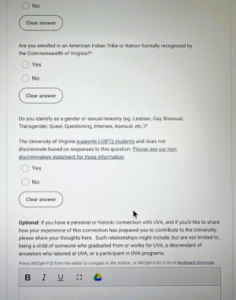
by James A. Bacon
When University of Virginia President Jim Ryan and Provost Ian Baucom announced the university’s new admissions policy last week, they made a point of saying that they had sought input and guidance from “leaders across the university,” including members of the Office of University Counsel.
But one key group was not consulted: the Board of Visitors.
That’s noteworthy because state code says the Board of Visitors sets the university’s admissions policy.
Describing the powers and authorities of the State Council of Higher Education for Virginia (SCHEV), state code notes that the SCHEV shall prepare enrollment projections for Virginia’s public colleges and universities. However, “the student admissions policies for such institutions and their specific programs shall remain the sole responsibilities of the individual governing boards.”
Not university presidents — the governing boards.
In a response to the U.S. Supreme Court’s ruling restricting the use of race in college admissions, Ryan outlined a plan that would eliminate racial/ethnic-identity checkboxes for applicants to UVa but would allow students to discuss their race-based experiences in the essay portion of the application. He did not obtain the Board of Visitors’ approval for the plan. He did not even present the plan to the Board for feedback. He did notify members of the Board of his plan but provided only a one-day notice.
The Supreme Court stated that schools could consider an applicant’s discussion “of how race affected his or her life, be it through discrimination, inspiration, or otherwise,” Ryan and Baucom wrote in a message to the university community. “To the extent a candidate’s race or ethnicity is disclosed through this process, that information only will be considered as it relates to that person’s unique ability as an individual to contribute to the University, and not on the basis of race or ethnicity alone.”
While eliminating the checkbox for race/ethnicity, UVa’s new application form does ask if applicants are members of a Virginia-recognized Indian tribe or a “sexual minority.” The form also asks if the applicant has a “personal or historic connection” to UVa, such as descent from “ancestors who labored at UVa.”
Some members of the Board find the new admissions policy troublesome and believe Ryan should have presented his proposed changes to the Board. Announcing a fait accompli in an email to Board members 23 hours before sending out the announcement falls far short of the requirement spelled out in the state code, says Board member Bert Ellis. (Ellis co-founded The Jefferson Council but no longer holds an office in the organization.)
The Ryan administration has dropped the requirement for students to provide SAT or ACT test scores, although students may submit them voluntarily. Ellis is concerned that UVa is moving toward a “totally subjective basis” for evaluating students. Moreover, he says, relying upon an essay is a problem because students increasingly use artificial intelligence as a writing crutch. These are issues the Board should contend with, he says.
I asked university spokesman Brian Coy how Ryan interpreted the state code as permitting him to leave the Board of Visitors out of the decision-making loop.
He replied: “As our announcement stated, the University modified admissions practices in response to the Supreme Court’s ruling in close coordination with the Office of the University Counsel. We are confident that the steps we took are consistent with state and federal law, as well as past practice here at UVA.”
Ryan’s decision to bypass the Board of Visitors represents a significant challenge for UVa’s new Rector, Robert Hardie, who assumed the position in July.
Last week The Jefferson Council alerted Hardie and other Board members to the fact that Baucom, in a discussion of major academic initiatives, had glossed over the fact in his presentation to the Board that between $20 million and $40 million had been allocated to programs for recruiting “under-represented” graduate students and faculty. Baucom had acknowledged in a presentation to the Faculty Senate that the decision required consultation with the Office of University Counsel, but neither the administration nor the University Counsel, who reports to Attorney General Jason Miyares, would respond to The Jefferson Council’s request for a description of that guidance.
Responding to an email from Jefferson Council president Tom Neale, Hardie wrote:
Thank you for your correspondence and sharing your concerns with the Board. I can assure you all members of the Board of Visitors take their fiduciary responsibilities seriously.
Following your letter, I spoke with Ian Baucom about these initiatives and how they align with our strategic plan. We all agree on the importance of keeping the full Board up to date on the implementation of that plan.
The administration’s responsibility to report major spending initiatives may seem self-evident to anyone who has served on a corporate board, but the obligation is not spelled out in the state code and may be subject to interpretation. The Board’s authority over admissions policy is spelled out.
Will Hardie fight to uphold the Board’s prerogatives? We’ll keep you posted.
James A. Bacon is executive director of The Jefferson Council.

Leave a Reply
You must be logged in to post a comment.